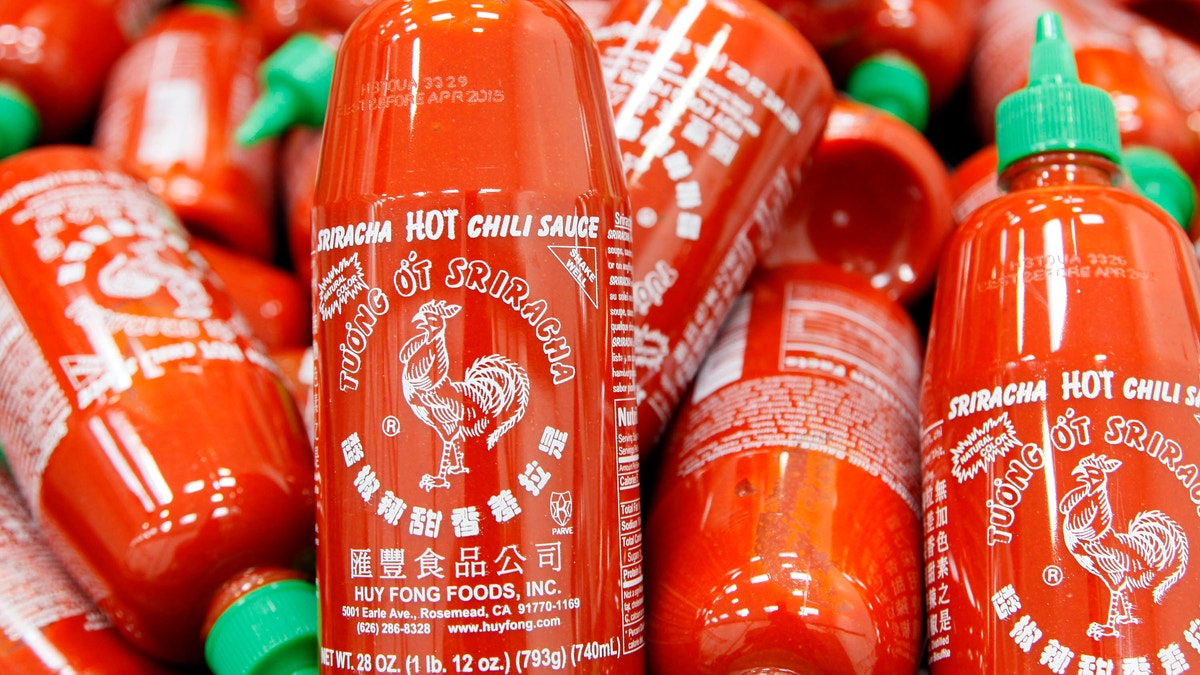
Oct 29, 2013: Sriracha chili sauce bottles are produced at the Huy Fong Foods factory in Irwindale, Calif. (The Associated Press)
Is a meal without Sriracha worth eating? It's a quandary that recently took on real and scary proportions for fans of the wildly — perhaps even weirdly — popular tangy Thai hot sauce.
Sriracha lovers had a near miss this week when a judge rejected a Southern California city's bid to shut down production at the Irwindale facility. Residents had complained that the pungent odor of peppers and garlic coming from the Huy Fong Foods plant gave them headaches, burned their throats and made their eyes water.
"If we did lose Sriracha, it would be a bigger crisis than having an oil shortage," joked — kind of — Edward Lee, who plies Asian-inflected Southern cuisine at 610 Magnolia in Louisville, Ky. "People would riot in the streets."
So far, the streets are clear. But it never hurts to be prepared.
Sriracha is a puree of ripe, red jalapeno peppers, sugar, salt, vinegar and garlic. But many similar — and some would say superior — sauces are widely available in ethnic markets, mainstream supermarkets or online. Most just haven't enjoyed the same attention as so-called Rooster Sauce, as some people call Sriracha (for the rooster on the Huy Fong label). So here are a few Sriracha alternatives that deserve their 15 minutes of fame.
SAMBAL OELEK
A chunky condiment of vinegar and lightly ground chilies, think of sambal oelek as Sriracha without the pureeing (or the garlic). Sambal delivers a big blast of heat, and works well on any food in need of spice.
"The flavor on it is very clean," says Scott Drewno, executive chef at The Source in Washington, D.C., where he uses it in stir-fries, dipping sauces and dozens of other preparations. "You can use it hot, cold," he says. "If the world didn't have Sriracha, it would definitely be the next thing."
GOCHUJANG
Drewno also is a big fan of gochujang, a Korean paste of chilies and fermented soy beans. Less assertive than other chili pastes, gochujang offers a salty, savory component similar to miso, with just a hint of heat.
"I use that rampantly," Drewno says. "You get that umami, that depth, that haunting resonating flavor profile." Drewno said he smears gochujang on grilled steak and other meats, or sometimes uses it as a marinade with rice vinegar, sesame oil and a pinch of sugar. It rocks as a rub for roast chicken, and does a fine job of adding depth and heat to chili.
CHIPOTLES IN ADOBO
Like Sriracha, chipotles are made from ripe, red jalapenos. The ripe chilies are picked, dried, then smoked to create chipotles. The dried peppers then are pickled in adobo, a tomato-based sauce spiked with vinegar, herbs and sometimes other dried chilies.
"They have that same wild mix as Sriracha, where it's sweet, it's spicy, it's tangy," says Pati Jinich, author of "Pati's Mexican Table: The Secrets of Real Mexican Home Cooking." ''That's what drives people crazy."
In the United States, the Mexican condiment most often is found in cans, but Jinich says that in Mexico it comes in squeeze bottles, just like Sriracha.
Chipotles in adobo can be used directly on sandwiches, and in stews, soups and other dishes, Jinich says. Or they can be used to add heat and smoke to salsas. When nothing but the whole chilies are left, she says, remove the seeds, then puree them with mayonnaise, yogurt or sour cream (or perhaps cream cheese?) for a smoky-spicy dip or spread.
WEST INDIAN HOT SAUCE
The island nations in the Caribbean Sea boast many assertive peppers, such as habaneros and the famous Scotch bonnet, which is about 40 times as hot as a jalapeno. Ground with vinegar, spices and sometimes mustard, these chilies deliver a powerful punch as a sauce.
"Sriracha is overrated," chef and cookbook author Allison Robicelli wrote in an email. "It's good, but not even close to the best hot sauce on earth."
Robicelli says she swears by Baron's West Indian Hot Sauce, a product of St. Lucia made from Scotch bonnets, onion, garlic and mustard. "It was a game changer," she says. "It was thick, like a robust marinara sauce, but instead of using tomatoes, they made it out of fresh Scotch bonnet pepper."
OLD FASHIONED, ALL-AMERICAN HOT SAUCE
Tabasco is nice, but that's hardly the only pepper in town. Specialty and online stores these days are overrun with hot sauces. If you can't find one that tickles your need to torture your tongue, there's something wrong. New York's premier Middle Eastern spice shop, Kalustyan's, is a great example. They sell hundreds of different bottled hot sauces from all over the country.
DIY
As a last resort, you could always make your own.
"It's not terribly difficult," Lee says. Mustard is complicated. Mayonnaise involves raw eggs. But hot sauce requires only peppers, vinegar, sugar and whatever herbs and spices you favor. Fresh habaneros, jalapenos and other chilies can be found at most grocers. Ditto for many dried chilies. And hot sauce recipes abound on the Internet.
"If you were to lose Sriracha, people would go into a state of shock," Lee says. "Then, like most good Americans, we would all become self-reliant."
